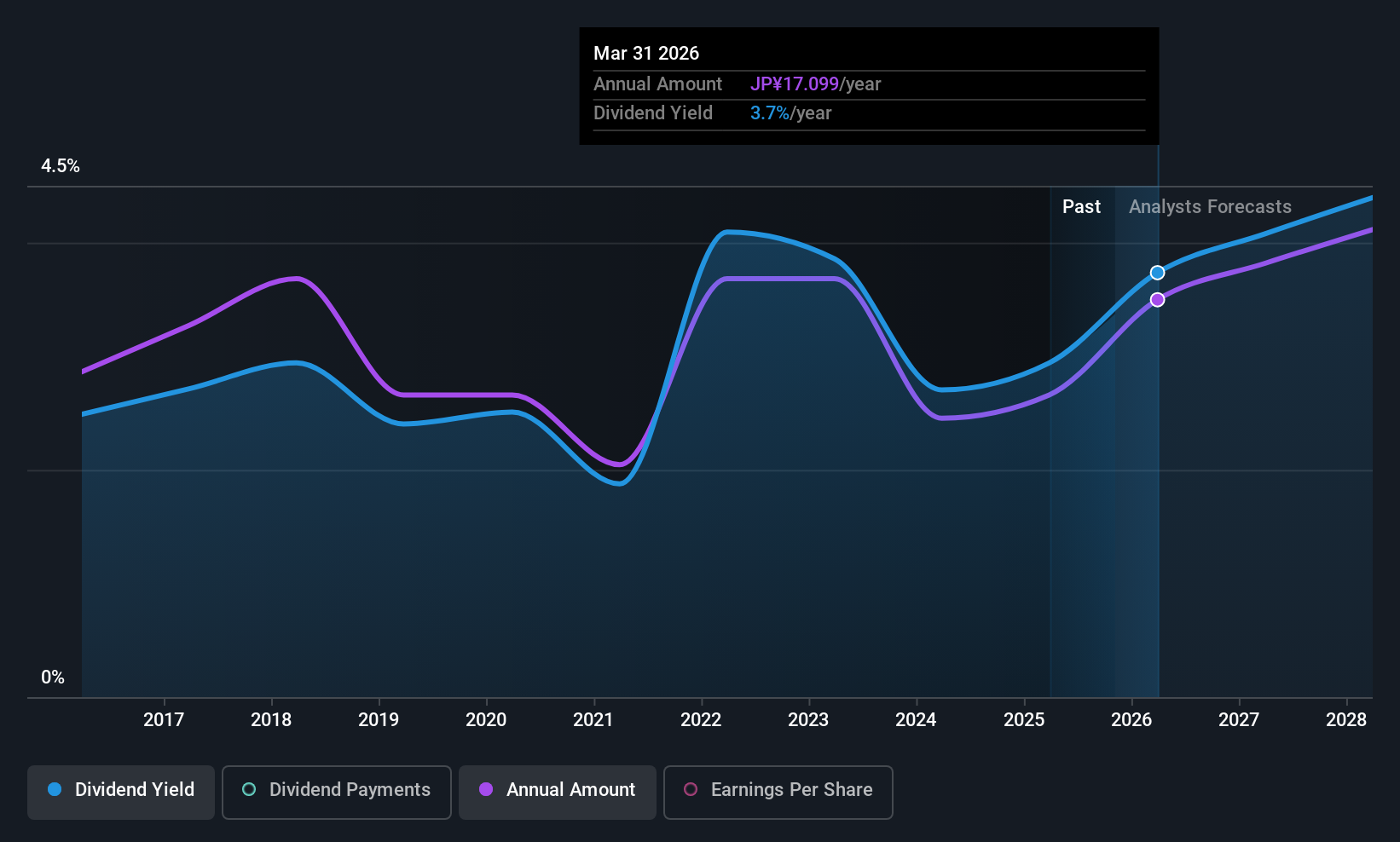Yamada Holdings Co., Ltd.'s (TSE:9831) dividend will be increasing from last year's payment of the same period to ¥17.00 on 30th of June. This will take the annual payment to 3.7% of the stock price, which is above what most companies in the industry pay.
Yamada Holdings' Future Dividend Projections Appear Well Covered By Earnings
We like to see robust dividend yields, but that doesn't matter if the payment isn't sustainable. Based on the last payment, Yamada Holdings was paying only paying out a fraction of earnings, but the payment was a massive 111% of cash flows. A cash payout ratio this high could put the dividend under pressure and force the company to reduce it in the future if it were to run into tough times.
Looking forward, earnings per share is forecast to rise by 13.1% over the next year. If the dividend continues on this path, the payout ratio could be 39% by next year, which we think can be pretty sustainable going forward.

View our latest analysis for Yamada Holdings
Dividend Volatility
The company has a long dividend track record, but it doesn't look great with cuts in the past. The dividend has gone from an annual total of ¥6.00 in 2015 to the most recent total annual payment of ¥17.00. This implies that the company grew its distributions at a yearly rate of about 11% over that duration. It is great to see strong growth in the dividend payments, but cuts are concerning as it may indicate the payout policy is too ambitious.
Dividend Growth May Be Hard To Achieve
Growing earnings per share could be a mitigating factor when considering the past fluctuations in the dividend. Earnings has been rising at 2.4% per annum over the last five years, which admittedly is a bit slow. Earnings growth is slow, but on the plus side, the dividend payout ratio is low and dividends could grow faster than earnings, if the company decides to increase its payout ratio.
In Summary
In summary, while it's always good to see the dividend being raised, we don't think Yamada Holdings' payments are rock solid. While the low payout ratio is a redeeming feature, this is offset by the minimal cash to cover the payments. We would probably look elsewhere for an income investment.
Investors generally tend to favour companies with a consistent, stable dividend policy as opposed to those operating an irregular one. Still, investors need to consider a host of other factors, apart from dividend payments, when analysing a company. Case in point: We've spotted 2 warning signs for Yamada Holdings (of which 1 is a bit unpleasant!) you should know about. If you are a dividend investor, you might also want to look at our curated list of high yield dividend stocks.
New: Manage All Your Stock Portfolios in One Place
We've created the ultimate portfolio companion for stock investors, and it's free.
• Connect an unlimited number of Portfolios and see your total in one currency
• Be alerted to new Warning Signs or Risks via email or mobile
• Track the Fair Value of your stocks
Have feedback on this article? Concerned about the content? Get in touch with us directly. Alternatively, email editorial-team (at) simplywallst.com.
This article by Simply Wall St is general in nature. We provide commentary based on historical data and analyst forecasts only using an unbiased methodology and our articles are not intended to be financial advice. It does not constitute a recommendation to buy or sell any stock, and does not take account of your objectives, or your financial situation. We aim to bring you long-term focused analysis driven by fundamental data. Note that our analysis may not factor in the latest price-sensitive company announcements or qualitative material. Simply Wall St has no position in any stocks mentioned.
About TSE:9831
Yamada Holdings
Operates in the consumer electronics retailing activities in Japan and internationally.
Proven track record average dividend payer.
Similar Companies
Market Insights
Community Narratives



